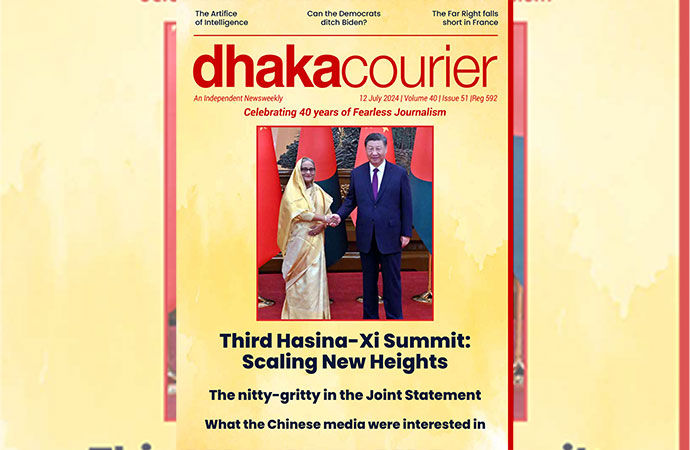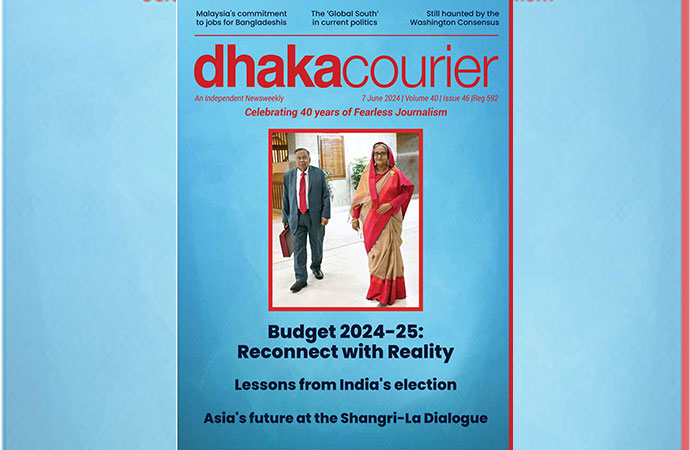Featured 2

Printing aqua saris, Katakhali Village, pc: Koli Bennett-Bose
The SUSTAIN public art installation transformed a building's six columns into monumental women clad in saris, holding up the world. Standing outside of Euclid Avenue in Washington DC, I felt the strength of women all over the world when I saw the 24 bright aqua and hot pink saris from Bangladesh adorned with woodblock and writing from two countries. Twelve aquamarine colored saris wrapped the tall grand columns of The LINE DC, a former church that is now a hotel. Another dozen bright pink fuchsia saris fluttered in parallel horizontal bands in Unity Park, creating a pedestrian passage. Our writings and poetry about our connection with the Earth were combined on the saris with artist Monica Jahan Bose's woodblocks on themes of climate, gender, and food justice.
As I stared at the saris hugging the majestic 20-foot columns, I was reminded of women who broke glass ceilings and raised standards. Esther in the bible stood before the king and saved a nation. Queen Cleopatra ruled over her kingdom. Mae Jemison stood proud in her astronaut uniform. Monica told me that she was thinking of the Erechtheum at the Acropolis in Athens, where women are the columns holding up a huge building. On the final day of SUSTAIN, three women joined Monica in a performance where we raised a sari up in the air above our heads and walked up the steps in a powerful gesture. The SUSTAIN installation celebrates a decade of Storytelling with Saris, an art and advocacy project about climate and gender justice led by Monica Jahan Bose in collaboration with women from her ancestral village, Katakhali on Barobaishdia Island, Patuakhali, Bangladesh and women and people of all genders from Washington DC and around the world.
The poetry painted on the saris was a microphone to everyone who has felt their voice was silenced: an outlet to voice our opinions on how we can address environmental and climate injustice and save our planet from destruction. Residents of Washington DC created poetry during workshops led by Monica Jahan Bose. We recorded the poems and Monica worked with musician and sound designer Sonia Herrero to create a "soundwalk" with seven stations accessed with phones, immersing us in English poetry and Bengali songs overlaid with music and ambient sounds and images from rural Bangladesh and the US. Link to Soundwalk Station 3.
I wrote a poem based on Monica's prompt to imagine ourselves as plants in communion with the soil. I recited it for the soundwalk and live at the SUSTAIN installation. Link to Soundwalk Station 2. I felt immense pride to be able to partake in the bigger vision of this collective effort. I inhaled and allowed my voice to be an instrument in that moment as I read my poem to the crowd, feeling how connected each one of us is to plants, growing, and food. We humans need to connect with plants and growing to understand the impacts of climate change, which is rooted in colonialism and leads to further racial and economic disparity.
SUSTAIN included a film screening of several short films. Monica has worked with filmmakers Leena Jayaswal and Paris Preston to create two new films about the impacts of climate change on farmers in Bangladesh, France, and the US. We learned that the extreme rains at the wrong time of year have led to crop loss in Bangladesh and the US. Women farmers from Katakhali Village, an island community in the Bay of Bengal, speak poignantly about the reduction in rice, watermelon, and dal from sudden rains during the traditionally dry winter season. They also showed us the terrible impact of the new Payra Coal Electric Plant that has been built nearby: black soot now covers the coconut and banana plants and the coconuts are deformed. Monica's decade-long project underscores the importance of moving away from fossil fuels to renewable energy as a means of cooling down the planet and reducing climate change and air pollution.
Joining Storytelling with Saris has given me passion to address food insecurity and climate change and demand a healthier environment. We have engaged in workshops on Zoom and outdoor performances in front of the US Senate and on the street, all to demand environmental justice. I have soaked it all in and felt rejuvenated. I remember when we were all outside under the sun in a workshop in the Hirshhorn Sculpture Garden. The sun each kissing our shoulders as we squinted, smiled and laughed towards each other. Monica shouted out to us take off our shoes and feel the soil, feel the grass, feel nature beneath us. The New Yorker inside of me hesitated, but she had a point. The earth is a part of us and over time with civilization and technological advances we have distanced ourselves from the beauty and authenticity of nature. In that moment, I took off my shoes and felt the brush of grass kiss the soles of my feet. I felt alive and one with nature.
Through Storytelling with Saris, Monica Jahan Bose reminds us we are truly one with nature. She uses the sari, a precolonial sustainable garment, as her vehicle and storyboard to connect women across the world. She weaves the story beautifully, integrating art and poetry and culture with these hand-women Bangladeshi saris that represent women's strength and resilience around the world. Follow the project at storytellingwithsaris.com.
Jumoke Opeyemi is a Nigerian-American poet and writer based in Washington, DC and New York.

























Leave a Comment
Recent Posts
How China's reform benefit the ...
"It's very clear that China has entered a new era under Presi ...
How do we heal?
After the unprecedented violence of the past two weeks, the most impor ...
The High Court fixed July 25 for delivering verdicts
Biden’s legacy: Far-reaching accomplishments that di ..
US President Joe Biden dropped out of the 2024 race
“A kiss over bribe”: Nachiketa’s social message to D ..